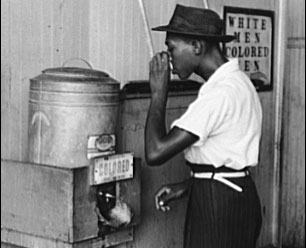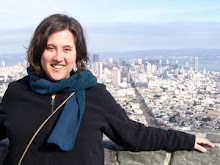During my drive home today I heard a rebroadcast of this amazing radio documentary chronicling Black and White Americans' memories of the Jim Crow days in the South. It's a collaboration of American RadioWorks and the Behind the Veil project of the Center for Documentary Studies (yeah Durham/Duke!). And it blew my mind.
The project website is great. According to a History Matters page (written by Jim Crespino of Emory University) on the history of Jim Crow:
"The site is produced in conjunction with a multimedia book project of the same name (2001) edited by William H. Chafe, Raymond Gavins, and Robert Korstad. Material for the Web documentary, as well as for a radio documentary that aired on National Public Radio (and which is available through this site), is drawn largely from interviews in the mid-1990s with members of the last living generation of African Americans to reach adulthood in the era of legalized racial segregation."
What I found most stunning about "Remembering Jim Crow" was the section entitled "Whites Remember Jim Crow." Not surprisingly, Whites in the southwestern Lousiana town of New Iberia recalled segregation days in profoundly different terms than African Americans. "Our Negroes were happy," said longtime Iberia Parish resident Mary Levaux, recalling cheerful smiles among plantation workers, seemingly joyous gospel melodies rising from Black churches, and a perception that Blacks adored and looked up to Whites because they "knew where their bread was buttered."
Now, it's not that this kind of thinking is new to me. It's just that this documentary was so well done -- and such a profound reminder of the depths of White people's cognitive dissonance about racism (the previous link will take you to antiracist educator Tim Wise's 2006 essay, "'Eracing' Katrina: Historical Revisionism and the Denial of the Obvious" -- to close the reflections-on-race-in-Lousiana loop.)
I'm reminded anew of my responsibility as an antiracist educator to interrogate White privilege in my own everyday life and the institutions with which I interact.
"...racial disparities matter, and...they tell us how far removed we are from the equal opportunity society we profess to be, against all evidence to the contrary." - Tim Wise, Eracing' Katrina...

